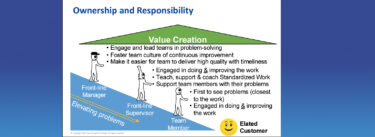I recently met with the chief executive of a very large American corporation organized by business units, each self-contained with its own product development, production, purchasing and sales functions. I asked what a CEO does in this situation and got a simple answer: “I search for heroic leaders to galvanize my business units. I give them metrics to meet quickly. When they meet them, they are richly rewarded. When they don’t, I find new leaders.”
I noted that his firm, like many others I’ve examined, has a high level of turnover in its business unit heads. So I asked a simple question: “Why does your company need so many heroes? Why don’t your businesses consistently perform at a high level so that no new leaders are needed? And why do even your apparently successful leaders keep moving on?”
The answer was that business is tough, leadership is the critical scarce resource, and that a lot of turnover indicates a dynamic management culture. But I couldn’t agree. As I look at this and many other businesses I encounter on my walks, I usually see three problems apparently unnoticed by the heroic leader at the top rolling out the latest revitalization program.
These are confusion about the business purpose of the organization’s core processes, poorly performing product development, production, supplier management and sales processes that tend to get worse instead of better, and dispirited people operating these broken processes at every level of the enterprise. Needless to say, there are also mini-heroes at every level devising workarounds for the defective processes.
What’s needed instead? More farmers!
Let me explain by means of a second example. Recently I received a copy of the leading motor industry magazine with its annual listing of the fifty most influential (read “heroic”) leaders in the global motor industry. Bill Ford at Ford. Carlos Ghosn at Renault/Nissan. Rick Wagoner at GM. Etc.
What I found striking was that the list contained no “leaders” from Toyota, except for one American in a U.S. marketing job. Yet Toyota is the world’s most successful car company. How could the most successful company have practically no heroes? Because its managers still think like the farmers around its headquarters in the remote Aichi region of Japan where the company was created.
The job of the hero is to tackle a situation in which everything is out of control and quickly impose some semblance of order. And sometimes heroes are necessary. Taiichi Ohno, Shotaro Kamiya, Kenya Nakamura, and Kiichiro Toyoda certainly took heroic actions at Toyota at moments of crisis as the company’s core processes were being defined after World War II.
But heroes shouldn’t be necessary once an organization is transformed. Instead every important process should be steadily tended by a “farmer” (who we often call a value-stream manager) who continually asks three simple questions: Is the business purpose of the process correctly defined? Is action being steadily taken to create value, flow, and pull in every step of the process while taking out waste? Are all of the people touching the process actively engaged in making it better? This is the gemba mentality of the farmer who year after year plows a straight furrow, mends the fence, and obsesses about the weather, even as the heroic pioneer or hunter who originally cleared the land moves on.
Why do we have so many heroes, so few farmers, and such poor results in most of our businesses? Because we’re blind to the simple fact that business heroes usually fail to transform businesses. They create short-term improvement, at least on the official metrics, but it either isn’t real or it can’t be sustained because no farmers are put in place to tend the fields. Wisely, they move on before this becomes apparent. Meanwhile, we are equally blind to the critical contribution of the farmers who should be our heroes. These are the folks who provide the steady-paced continuity at the core of every lean enterprise.
I hope that as you think about your job you will become a lean farmer who takes responsibility for the processes you touch and that you will work every day to plow the straight furrow, mend the fence, and obsess about the weather. These are the real value-creating aspects of management. When present they insure that no heroes will be needed in the future.
Best regards,
Jim
Jim Womack
Chairman and CEO
Lean Enterprise Institute (LEI)






